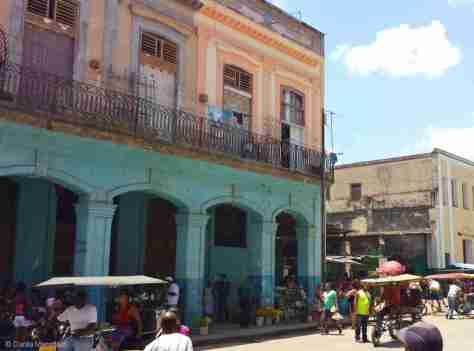Cuba is all that and more. It’s a developed country with an educated workforce with teachers, doctors and engineers, but the water is not safe to drink (even the locals buy bottled water).
 Because of the guarantee of jobs to those who have graduated from higher education, more and more people have moved away from the land and into the cities, so Cuba struggles with feeding itself. It’s hard to get statistics on the Cuban economy. Figures published by Cuba are questioned by other countries. What I’ve written here was gathered by observation and discussion.
Because of the guarantee of jobs to those who have graduated from higher education, more and more people have moved away from the land and into the cities, so Cuba struggles with feeding itself. It’s hard to get statistics on the Cuban economy. Figures published by Cuba are questioned by other countries. What I’ve written here was gathered by observation and discussion.
Some people appear prosperous and well-fed, others are barefoot and beg – not just from tourists, but from locals too.
Cubans are warm, open-hearted and delighted to exchange conversations and ideas with visitors. Without wishing to appear condescending, they’re charmingly naïve, but this is not surprising in people who have no access to the internet, and are not allowed to travel outside their country. We spent some time chatting with two local young men who told us they truly love their country, but they would also love the opportunity to travel and see something of the world: “we’ll come back, why wouldn’t we?!” When the subject of freedom of speech came up, the reply was “we can’t talk about that. We literally cannot talk about that.”
Another day we took a fun horse and carriage ride round old Havana. So many beautiful buildings!

All the locals we spoke to said they think the improvement of relations with the USA is a good thing, and they’re really looking forward to welcoming more American visitors. Will this bring unwanted change though? Havana is full of large, beautiful, but crumbling colonial houses, that will fall under the hammer to Americans looking for cheap vacation houses. But what will happen to the locals, who told us that it was impossible for one person to buy a whole house, it was far too expensive, maybe as much as $25,000 or $30,000 (US$). At the moment, non-Cubans are not legally allowed to buy property here, but that is bound to change eventually.
The locals didn’t want to talk to us about who will follow Raul Castro. Fidel is no longer seen in public, and Raul is not getting any younger.
Havana has many charms, small restaurants, nightlife, museums. The beaches on the small islands and peninsulas along the northern coast of Cuba have miles of pale soft sand fringing turquoise water to rival those of any other Caribbean island. There are resorts here: Europeans and Canadians have enjoyed them for years. I expect that when the US-Cuba situation normalizes, even more, and higher-rise ones will be built.
The currency is confusing: the CUC is equal to the US$, and is for tourist use, the CUP is for the locals, and the value is different. You can’t get CUCs outside of Cuba, and when you use your non-US issued debit or credit card, there’s a surcharge of 3% immediately, not counting whatever your local bank might charge you. You can change US dollars, but there’s an additional surcharge of 11%. US-issued credit or debit cards are not accepted.
Internet is generally available at tourist hotels – for a fee, and even then some websites won’t load at all.
Availability of media is confusing: TVs in hotels show local Cuban programs, together with CNN and BBC World News. The video screen at the local paladar was showing current American music videos, and the bartender told us much of her (very good) English had been learned by watching Harry Potter films!

Paladares: that’s another confusing thing. Some restaurants are government owned and some are private – those are the “paladares” which literally means “palate”. Locals and visitors alike agree that the paladares generally have far better food, and are also less expensive than the government-run restaurants. Through a recommendation from an English couple we chatted with at our hotel, we went out to dinner at El Litoral just 10 minutes’ walk from the Hotel Nacional de Cuba, where we stayed for a week. I’m glad we got that recommendation, but sad it was on our last day! We had a truly delicious meal, well up to any international standards, and probably paid half as much as we might have expected for a similar meal in Europe or the US. We also met a Scottish/Irish couple, eating their dinner at the bar as we did, because the tables were fully booked, who told us they had been unsuccessfully emailing and phoning the restaurant for weeks in advance of their arrival to try to book a table!


Cuba is a riddle, wrapped in a mystery, inside an enigma (with apologies to Winston Churchill for mis-using his quote on Russia!) Is there private enterprise here? Yes. Do locals have access to the internet? We were told by locals that they don’t, nor can they travel freely. What kind of government will follow the deaths of the Castro brothers? What will happen when US-Cuban relations are completely normalized? I don’t know, but I truly hope that the generosity of spirit, warmth and openness that we experienced here is not changed by other changes. I hope they save the beautiful old architecture too!
Want to keep following our travels? Click below to get our free newsletter. Our promise to you: we will never spam you or sell your email!

























































Fascinating blog entry. Loved the pictures too. Cuba looks like an interesting place to visit.